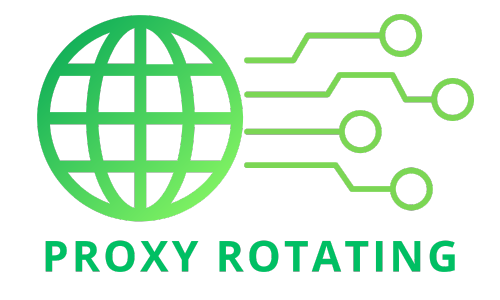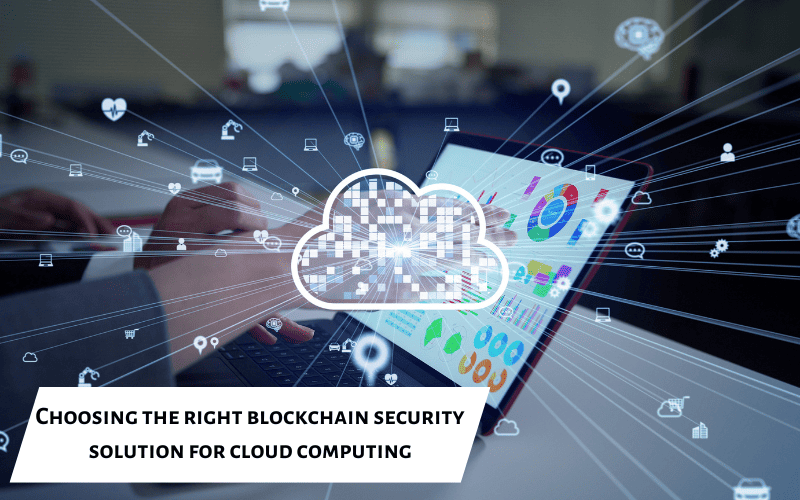Integrating blockchain and cloud computing represents a unique combination of today’s most advanced technologies to create a secure, transparent, and immutable information system. This not only improves security through the decentralized mechanism that blockchain offers but also leverages the computational power and flexible storage capabilities of cloud computing. Using blockchain to secure cloud computing opens up a new method to protect data from cybersecurity threats while enhancing the efficiency and security of cloud services. This article will explore how integrating blockchain security in cloud computing can elevate data security to a new level.
Learn about blockchain security in cloud computing.
Blockchain security in cloud computing refers to utilizing blockchain technology to enhance the security aspects of cloud computing environments. By integrating blockchain into cloud computing systems, organizations can achieve greater transparency, immutability, and decentralization in their data management and access control mechanisms. This can help mitigate various security risks, such as data breaches, unauthorized access, and tampering with sensitive information stored in the cloud. Additionally, blockchain can enable secure and verifiable transactions between cloud service providers and users, strengthening the overall security posture of cloud computing infrastructures.

Benefits of using blockchain security in cloud computing
Using blockchain security in cloud computing environments brings forth a comprehensive suite of benefits that directly address the core concerns surrounding cloud data security, management, and costs. Here’s a detailed exploration of these benefits:
Enhancing data security
- Safe, transparent, and tamper-proof data storage: Blockchain ensures that data stored in the cloud is secure and transparent to authorized parties. Its tamper-proof nature comes from the immutable record of data transactions, making unauthorized alterations easily detectable.
- Strict data access control: The technology enables precise control over who can access data stored on the blockchain. Access permissions can be managed dynamically and securely through smart contracts, enhancing the security of sensitive information.
- Minimizing the risk of cyberattacks: Blockchain’s decentralized structure significantly reduces the risk of centralized cyberattacks. With a single point of failure, it becomes much easier for attackers to compromise the integrity and availability of the stored data.
Enhancing traceability
- Tracking the origin of data and activities on the cloud: Blockchain provides an unalterable ledger of all transactions, allowing for the detailed tracking of data origin and movements across the cloud environment. This feature is crucial for audit trails and forensic analysis.
- Improving transparency and accountability: Blockchain’s inherent transparency facilitates a clear view of transactions and data access, bolstering accountability among users and providers. Stakeholders can verify transactions independently, ensuring actions are justified and within policy bounds.
Improving identity management efficiency
- Safe and decentralized identity verification: Cloud services can implement decentralized identity verification mechanisms by leveraging blockchain. These systems minimize reliance on traditional, centralized identity verification services, which can be vulnerable to attacks and outages.
- Preventing identity fraud and unauthorized access: Blockchain’s secure and decentralized identity management systems significantly reduce the risk of identity fraud. They ensure that only authenticated users gain access, safeguarding against unauthorized data breaches.
Reducing security costs
- Automating security processes: Automating security protocols and compliance checks through smart contracts on the blockchain reduces the need for manual oversight and lowers operational costs associated with security management.
- Eliminating the need for intermediaries: Blockchain facilitates direct interactions between parties on the cloud platform. By removing intermediaries, organizations can save on the costs associated with third-party security services, further streamlining operations and enhancing trust through direct engagements.
Integrating blockchain into cloud computing security strategies not only tightens the security of cloud-stored data but also introduces efficiencies in traceability, identity management, and cost reduction. This paradigm shift towards a more secure, transparent, and efficient cloud computing model underscores the transformative potential of blockchain technology in addressing current and future cybersecurity challenges.
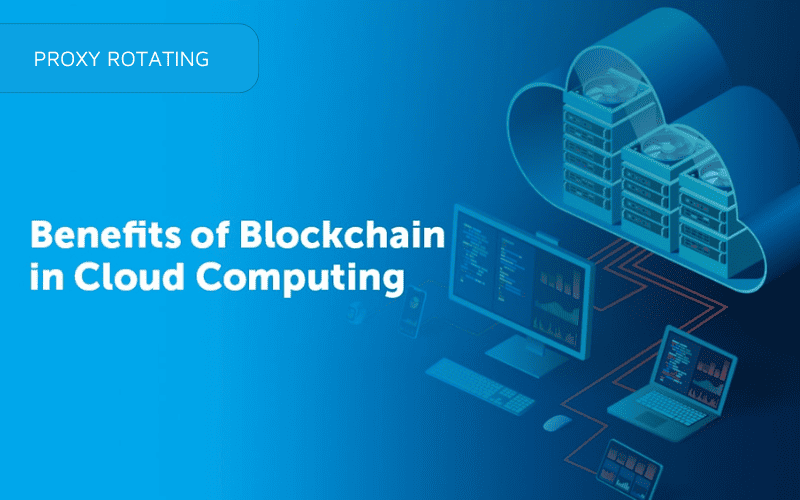
Applications of blockchain in cloud computing security
Blockchain security in cloud computing strengthens existing security measures and introduces innovative applications that address longstanding challenges in data management, identity verification, cybersecurity, and supply chain integrity. Here’s an exploration of how blockchain is applied across these domains:
Data security
- Safe data storage on the blockchain: Leveraging blockchain for data storage involves distributing data across a network, enhancing data redundancy and resilience against attacks. The immutable nature of blockchain ensures that once data is stored, it cannot be altered, providing a secure and tamper-proof repository.
- Data encryption and strict access control: Blockchain enhances data security through advanced encryption techniques, ensuring that data is accessible only to users with the correct decryption keys. Access control mechanisms are enforced through smart contracts, allowing for dynamic and secure management of user permissions.
Identity management
- Decentralized identity verification: Blockchain enables the creation of decentralized identities (DIDS), allowing users to control their identity information without relying on central authorities. This system reduces identity theft risk and simplifies verification across different services.
- Providing safe and convenient login services: Using DIDS, blockchain offers a more secure and user-friendly way to log into cloud services. Users can authenticate themselves without repeatedly providing sensitive information, minimizing exposure to phishing attacks and data breaches.
Cybersecurity auditing
- Recording unchangeable cybersecurity logs: Using blockchain for cybersecurity auditing involves creating an immutable log of all system activities and security events. This unalterable record enhances the integrity of audit trails, making it easier to verify actions and detect unauthorized changes.
- Detecting and tracing security breaches: The transparent and chronological nature of blockchain allows for real-time monitoring and analysis of security events. This capability facilitates the early detection of anomalies and breaches, enabling quicker response and mitigation efforts.
Supply chain security
- Tracking product origin: Blockchain provides a transparent and immutable ledger for recording the journey of products from origin to consumer. This traceability ensures that all stakeholders can verify the authenticity and origin of products, reducing the prevalence of counterfeits in the market.
- Counteracting counterfeits and ensuring product quality: Blockchain is crucial in verifying product authenticity and quality through its secure and transparent tracking capabilities. It allows for the verification of certifications and standards compliance, ensuring that products meet the required quality and safety standards.
These blockchain applications in cloud computing security demonstrate the technology’s potential to revolutionize how data is stored, accessed, and verified. By providing a secure, transparent, and efficient framework for managing digital identities, enhancing data security, conducting cybersecurity audits, and ensuring supply chain integrity, blockchain stands as a cornerstone technology for advancing cloud computing security.

Comparing blockchain security solutions for cloud computing
Comparing blockchain security solutions for cloud computing involves assessing different blockchain frameworks, platforms, and protocols designed to enhance security in cloud environments. These solutions vary in terms of consensus mechanisms, scalability, interoperability, and specific security features. Here’s a comparative overview of some key considerations:
Consensus mechanisms
Proof of Work (PoW) vs. Proof of Stake (PoS): PoW, used by Bitcoin, requires significant computational power to validate transactions and add new blocks to the blockchain, which can be energy-intensive. PoS, on the other hand, used by Ethereum 2.0 and other platforms, selects validators based on the number of tokens they hold and are willing to “stake” as collateral, which is less energy-intensive and potentially offers faster transaction validation times. PoS and other consensus mechanisms like Delegated Proof of Stake (DPoS) or Practical Byzantine Fault Tolerance (PBFT) might be more suitable for cloud security due to their scalability and efficiency.
Scalability
Public vs. Private Blockchain: Public blockchains, like Ethereum, offer high transparency and security but can face scalability issues due to their decentralized nature. Private blockchains, on the other hand, restrict participation in the network, which can significantly improve transaction speeds and scalability but at the potential cost of centralization. Private or consortium blockchains might be preferred for cloud computing applications requiring high throughput and privacy.
Interoperability
Solutions like Polkadot and Cosmos aim to enable blockchain interoperability, allowing different blockchain networks to communicate and exchange data securely. Interoperability is crucial for cloud computing security solutions integrating with various blockchain platforms and legacy systems to provide comprehensive security coverage.
Specific security features
Encryption and privacy technologies: Some blockchain solutions incorporate advanced encryption and privacy-preserving technologies like zk-SNARKs (Zero-Knowledge Succinct Non-Interactive Arguments of Knowledge) or homomorphic encryption, enhancing the confidentiality and privacy of data stored and processed in cloud environments. For example, Ethereum’s transition to Ethereum 2.0 is expected to bring scalability, security, and sustainability improvements, potentially making it more suitable for specific cloud computing security applications.
Intelligent contract capabilities: Platforms like Ethereum that support smart contracts enable automated security policies, access control, and compliance protocols. The robustness of a platform’s innovative contract capabilities can significantly impact its suitability for complex cloud computing security tasks.
Use case specificity
Hyperledger Fabric: Designed for enterprise use, Hyperledger Fabric offers modular architecture and permissioned network participation, making it a strong candidate for businesses seeking to implement blockchain for secure and efficient cloud computing operations without the need for cryptocurrency.
Corda: Focused on financial services, Corda provides a permissioned blockchain platform that ensures data privacy and scalability, making it suitable for secure financial transactions in the cloud.
When comparing blockchain security solutions for cloud computing, the cloud environment’s specific security, performance, and operational requirements must be considered. Factors like the sensitivity of the stored data, the need for regulatory compliance, transaction throughput requirements, and integration with existing systems will guide the selection of the most appropriate blockchain solution.
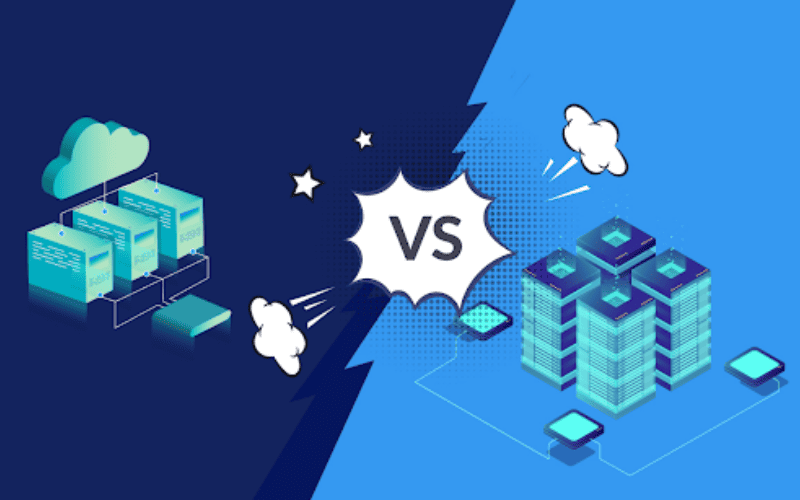
Choosing the right blockchain security solution for cloud computing
Choosing the right blockchain security solution for cloud computing involves a nuanced understanding of your organizational needs and the specific features of various blockchain platforms. Here’s a structured approach to making an informed decision:
Specify your security needs
Start by outlining the security challenges you face in your cloud computing environment. This may include data breaches, unauthorized access, identity theft, data tampering, and compliance with regulatory standards. Understanding these requirements will help you identify the key features you need in a blockchain solution, such as data encryption, transaction transparency, immutability, or innovative contract capabilities.
Assess scalability needs
Consider the scale at which you plan to implement blockchain within your cloud infrastructure. Public blockchains, while offering high levels of security and decentralization, might face scalability challenges. Private or consortium blockchains can provide better scalability and speed but may offer a different security model. Your choice should align with the expected volume of transactions and the size of the data you wish to secure.
Evaluate consensus mechanisms
Blockchain platforms utilize various consensus mechanisms, impacting their speed, security, and energy efficiency. Proof of Work (PoW) is highly secure but energy-intensive, whereas Proof of Stake (PoS) offers a more energy-efficient alternative. Other mechanisms, like Delegated Proof of Stake (DPoS) or Practical Byzantine Fault Tolerance (PBFT), may balance speed and security. Choose a mechanism that fits your security needs and operational constraints.
Consider interoperability
In today’s diverse digital ecosystem, the ability to interact with other blockchain networks and traditional systems is crucial. Look for blockchain solutions that support interoperability, ensuring you can securely exchange data across different platforms and integrate blockchain into your existing cloud infrastructure without significant friction.
Review smart contract functionality.
Smart contracts automate and enforce the execution of agreements within the blockchain. Evaluate the robustness of a platform’s innovative contract capabilities, especially if you plan to implement automated security policies, compliance checks, or other complex operations that require reliable and flexible contract logic.
Understand privacy and compliance features.
Privacy and regulatory compliance might be paramount depending on your industry and the nature of the data you handle. Blockchain solutions offering advanced privacy features like zero-knowledge proofs, private transactions, and permission access can help you meet these requirements while leveraging blockchain’s security benefits.
Analyze the developer and community support.
A strong developer community and comprehensive documentation can significantly ease the implementation process. Platforms with active support and a wealth of resources can help you navigate technical challenges and ensure your blockchain security solution stays up-to-date with the latest advancements and security practices.
Conduct a pilot project.
Before full-scale implementation, consider conducting a pilot project with the selected blockchain solution. This will allow you to evaluate its effectiveness in meeting your security needs, compatibility with your cloud environment, and any operational challenges.
Choosing the right blockchain security solution for cloud computing is a strategic decision that influences the security of your data and transactions and the efficiency and flexibility of your operations. By carefully considering these aspects, you can select a blockchain platform that enhances your cloud computing security posture while aligning with your business objectives and operational requirements.
The impact of blockchain on cloud computing security
The impact of blockchain on cloud computing security is profound and multifaceted, fundamentally transforming how data security, privacy, and trust are approached within cloud environments. Here’s an exploration of the key areas where blockchain technology is making a significant impact:
Augmented protection and preservation of data integrity
Blockchain introduces an immutable ledger for recording transactions, ensuring that once data is entered, it cannot be altered or deleted without consensus across the network. This immutability strengthens data integrity, providing a secure and tamper-proof environment for storing sensitive information in the cloud. The decentralized nature of blockchain further complicates potential cyberattacks, as there’s no single point of failure, thereby enhancing the overall security of cloud services.
Decentralized data management
By decentralizing data storage, blockchain mitigates risks associated with centralized data repositories, prime targets for cyberattacks. Data distributed across a blockchain network is less susceptible to hacks, unauthorized access, and data breaches, providing a robust solution to one of cloud computing’s inherent vulnerabilities.
Enhanced privacy and secrecy
Blockchain technology can enhance privacy and confidentiality in cloud computing through encryption and sophisticated privacy-preserving technologies such as zero-knowledge proofs. These mechanisms allow for the verification of transactions without revealing the underlying data, offering a way to maintain transparency and trust while safeguarding user privacy.
Trading is transparent and verifiable.
Blockchain ensures all transactions are transparent and easily verifiable, fostering trust among users and providers. The ledger provides a clear, auditable trail of all activities, enhancing accountability and compliance with regulatory requirements. This level of transparency and auditability is precious in sectors where data authenticity and verifiability are critical.
Secure identity management
Blockchain facilitates secure and efficient identity management through decentralized identities (DIDs), reducing reliance on centralized identity providers prone to data breaches. DIDs allow individuals and entities to control their identity information, enhancing security and privacy in cloud-based applications and services.
Automation and efficiency in security procedures
Smart contracts automate various security processes, including access controls, compliance checks, and responses to security incidents. This automation reduces the potential for human error, streamlines security management, and ensures consistent application of security policies across the cloud infrastructure.
Cost reduction
By automating security processes and eliminating the need for intermediaries or centralized authorities for transaction verification, blockchain can significantly reduce the costs associated with cloud computing security. The efficiency and scalability blockchain offers can lead to more cost-effective solutions for securing cloud environments.
Challenges and considerations
While blockchain presents numerous advantages for cloud computing security, it also introduces challenges such as scalability issues, energy consumption (particularly with Proof of Work consensus mechanisms), and the need for interoperability between different blockchain platforms and existing cloud infrastructure. Addressing these challenges requires innovation and collaboration between blockchain developers, cloud service providers, and industry stakeholders.
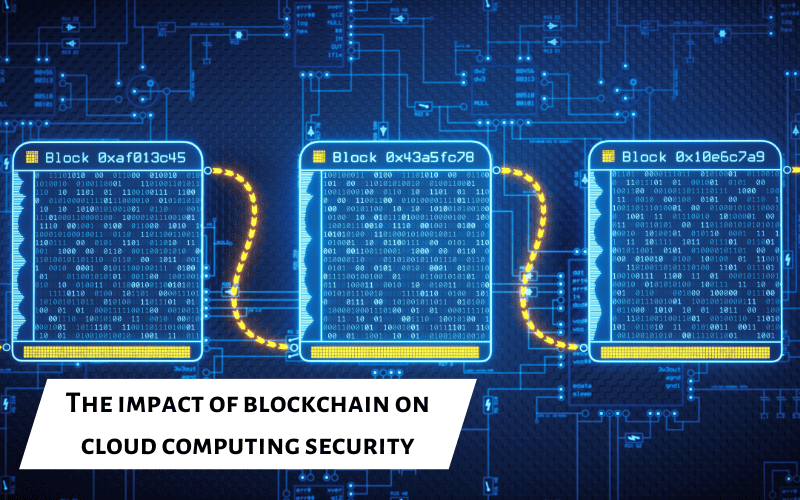
Blockchain security in cloud computing can help improve the efficiency and reliability of current security systems. For more information related to blockchain, visit the Proxy Rotating website at https://proxyrotating.com.
>>> See more:
Blockchain security statistics
Blockchain security vs cyber security
